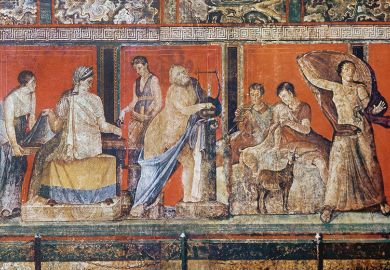The University of Wollongong’s academic senate has protested against the process by which the institution’s administration secured approval for a controversial degree in Western civilisation, in a move that raises questions over governing bodies’ powers and responsibilities.
At a 20 March meeting, the senate objected to the use of a “fast-track” process to approve the course, which – under an agreement quietly reached last year – will be funded by the Ramsay Centre for Western Civilisation.
The motion complaining about the use of the process was passed by a majority of senate members, with 28 voting in favour and 16 opposing. The senate also unanimously passed a motion calling for the fast-track process to be included in an upcoming review of course approval procedures.
The National Tertiary Education Union’s Wollongong branch president, Georgine Clarsen, said the senate’s move would compel the university council to revisit the decision to partner with the Ramsay Centre.
“Obviously, [the] academic senate has a say when it comes to academic matters being properly instituted,” Dr Clarsen said. “University council is obliged to look at that very seriously.
“[The agreement] was done with no transparency and undue haste, over the Christmas period, when so many people were on leave.”
In a statement, the university said that the senate resolution had “no direct impact” on the partnership with Ramsay. “The bachelor of arts in Western civilisation will commence in Autumn session 2020, as previously announced,” it said.
The university said the fast-track process had existed for more than 20 years as part of long-standing arrangements to establish for new courses. The mechanism allowed programmes to be approved between senate meetings, subject to certain conditions.
In this instance, fast-track approval had been required because of “very tight deadlines” for listing the course with the Universities Admissions Centre, the university said. “The vice-chancellor and executive remain satisfied that the application of the fast-track approval process met current policy requirements.”
Dr Clarsen said fast-tracking was appropriate for “tweaking a course, sending it to a new location, deleting a course that is no longer current and so on – not instituting an entire BA without systematic review. That is against transparency in university processes.
“What we have seen is our management barrelling ahead against all objections to the way that a deal has been negotiated with Ramsay.”
Wollongong raised eyebrows when it announced the deal with Ramsay about a week before Christmas, following secret discussions. Negotiations at the Australian National University and the universities of Sydney and Queensland, where there has been widespread consultation over proposals to forge partnerships with the centre, have attracted fierce staff and student backlashes.
Last month, it emerged that the wording of Wollongong’s agreement with Ramsay, originally signed in December, had been changed and “re-signed” a month later. The new wording outlined the circumstances under which Ramsay representatives could observe classes – a topic of contention at other universities.
Theo Farrell, Wollongong’s executive dean of law, humanities and arts, said the new wording was a clarification of the agreement’s original intention rather than a renegotiation of the agreement.
Register to continue
Why register?
- Registration is free and only takes a moment
- Once registered, you can read 3 articles a month
- Sign up for our newsletter
Subscribe
Or subscribe for unlimited access to:
- Unlimited access to news, views, insights & reviews
- Digital editions
- Digital access to THE’s university and college rankings analysis
Already registered or a current subscriber?









